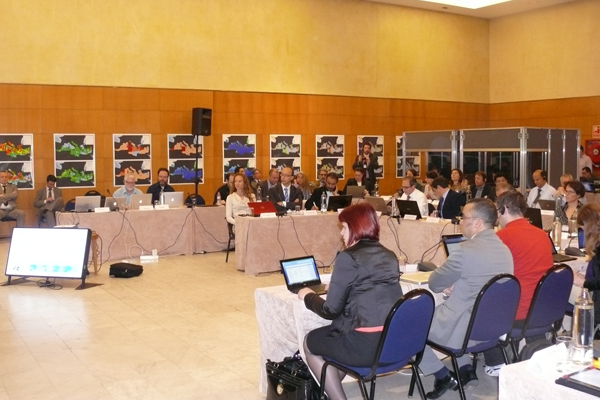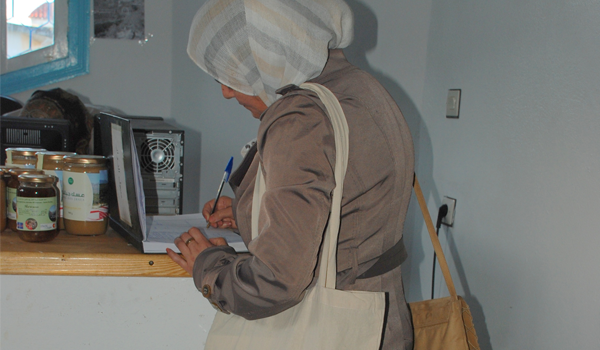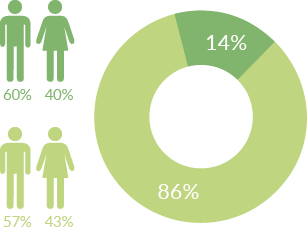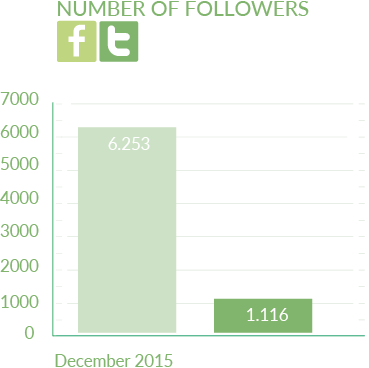

The transfer of knowledge and skills to Mediterranean people is considered a pillar stone in our fight against biodiversity loss. In addition to the various capacity building workshops organized in the framework of IUCN-Med projects for a better management of ecosystems and species towards conservation, the digital dimension of knowledge transfer and training has been reinforced at various levels, beyond IUCN’s official website. Within this context, IUCN-Med has promoted public access to key information on Mediterranean biodiversity and IUCN-Med conservation initiatives namely through the following channels:
Face-to-face training sessions have however continued being an important component of IUCN-Med projects. To mention some, the PPI-OSCAN initiative is strengthening the technical, administrative and financial capacity of CSOs in four North African countries (Algeria, Libya, Morocco and Tunisia) to develop specific field projects and contribute to the implementation of strategies and national actions plans for conservation and enhancement of biodiversity, sustainable management of natural resources, and mitigation of negative climate change effects.
Various workshops dealing with sustainable tourism products have also helped improve the capacity of Mediterranean tour operators to deploy better ecological services and products in protected areas. Emblematic species conservation strategies and action plans for North Africa on the other hand are bringing together public administrations, researchers and CSOs working on feasible and urgent measures to protect key biodiversity and habitats such as Important Plant Areas across the Mediterranean, the Great bustard in Morocco, the Barbary sheep in Tunisia, the Barbary macaque in Algeria, or the Cuvier’s Gazelle across the three countries. IUCN-Med also collaborates with the University of Cadiz with practical lessons on Red Listing.
 In partnership with IUCN Member Malaga Council, IUCN-Med celebrated the
World Environment Day on 5 June through the organization and participation
in open activities to raise awareness on the importance of Citizens’
participation under the motto of “Raise your voice, not the sea level”
in 2014 and “Seven Billion Dreams. One Planet. Consume with Care” in 2015.
Initiatives organized gathered several schools on the beach and various
town locations to witness the importance of marine pollution, an
exhibition of artistic works made of recycled materials, craft workshops
and a micro-story contest under the United Nations motto among others.
In partnership with IUCN Member Malaga Council, IUCN-Med celebrated the
World Environment Day on 5 June through the organization and participation
in open activities to raise awareness on the importance of Citizens’
participation under the motto of “Raise your voice, not the sea level”
in 2014 and “Seven Billion Dreams. One Planet. Consume with Care” in 2015.
Initiatives organized gathered several schools on the beach and various
town locations to witness the importance of marine pollution, an
exhibition of artistic works made of recycled materials, craft workshops
and a micro-story contest under the United Nations motto among others.
In collaboration with the IUCN National Committee, the Malaga Cinema Festival hosted in March 2015 for the first time a special section on environmental issues which included three films followed by a public debate and a nature photography workshop. IUCN-Med also collaborated with Onda Azul Malaga, a local TV station, in several interview programmes to help raising awareness on environmental issues of Mediterranean relevance.
 IUCN-Med knowledge products in the form of publications and reports have
been distributed among Members and partners in the region, with a
significant decrease in hard copy materials to promote the use of
digital formats and diminish the consumption of paper among our
constituency.
IUCN-Med knowledge products in the form of publications and reports have
been distributed among Members and partners in the region, with a
significant decrease in hard copy materials to promote the use of
digital formats and diminish the consumption of paper among our
constituency.
The involvement of the IUCN Secretariat in regional meetings and events in support of Members and partners has also helped spread the word on IUCN’s mission, work and achievements in the Mediterranean. Networking and partnerships with key institutions have been fostered at government, NGO and scientific level as a requirement for the implementation of conservation activities in the Mediterranean. In particular, the participation at the World Parks Congress in Sydney and the organization of the second IUCN North Africa Conservation Forum in Cairo, Egypt, from 4 to 6 October 2015, which has resulted in more than 70 people debating under the theme ´Conserving Nature in North Africa: A common challenge for a prosperous future´. The Forum concluded with a renewed commitment to strengthen membership in the region and the involvement of IUCN Members in the implementation of the IUCN Programme 2017-2020 at North Africa level.
 Relationships with Mediterranean media in the past two years have
focused, in addition to the cover of IUCN-Med key news stories, on
achieving a regional dimension towards better environmental information.
At Mediterranean level, a new agreement signed with the leading Spanish
speaking EFE press agency in June 2015 has set the path to establish a
framework for the development of initiatives that will help improve
environmental information quality in the Mediterranean. Thus, the first
environmental forum for Mediterranean press agencies has been held in
Malaga in December 2015 to strengthen and deepen cooperation with
intergovernmental organizations involved in natural resource conservation
and its media coverage in the region. Additionally, the eLearning
initiative for communication professionals in North Africa supported by
FM6E in Morocco has been expanded with the participation of journalists
beyond the North African region.
Relationships with Mediterranean media in the past two years have
focused, in addition to the cover of IUCN-Med key news stories, on
achieving a regional dimension towards better environmental information.
At Mediterranean level, a new agreement signed with the leading Spanish
speaking EFE press agency in June 2015 has set the path to establish a
framework for the development of initiatives that will help improve
environmental information quality in the Mediterranean. Thus, the first
environmental forum for Mediterranean press agencies has been held in
Malaga in December 2015 to strengthen and deepen cooperation with
intergovernmental organizations involved in natural resource conservation
and its media coverage in the region. Additionally, the eLearning
initiative for communication professionals in North Africa supported by
FM6E in Morocco has been expanded with the participation of journalists
beyond the North African region.
In line with the current efforts of IUCN to reach a wider audience, new communication strategies have been put in place to have a presence in social media platforms. Since the creation of our Twitter account in October 2013 and Facebook in June 2014, the number of IUCN-Med followers has significantly increased, reaching 6243 Likes on Facebook and 1116 Followers on Twitter in December 2015.




Our Facebook and Twitter accounts have different audiences, which is helping us reach different Mediterranean sectors. Indeed, our Facebook followers are located in North-Africa and are French and Arabic speaking, while our Twitter followers are mostly located in Europe.
You can check our publications and multimedia section to access the various portals and project websites developed in the past two years.